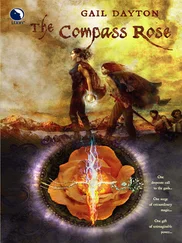“I see. yes,” Orte said. The abyss hung under him, he held his brother’s hand. “The train,” he said.
“At two o’clock almost exactly,” Nikolas said.
Retsia said, “We’ve been calling the station all afternoon. The whole railway above Aris is under water. You must be worn out, poor Eduard! And not knowing, all day long, the whole afternoon!” Tears ran down her face as plentiful and simple as rain running down the windows of the train.
Orte had intended to ask several questions of Nikolas before he went up to see his mother: Had it in fact been a severe attack? Is she on the same medication? Has there been much angina? Now he still wanted to ask these questions, which after all had not been answered. Nikolas continued to tell him about the death, but he had not asked about that. It was not fair. He still felt a little light-headed, but that was from travelling all day. The abyss had closed and he had let go Nikolas’s hand. Retsia hovered close, smiling, tearful. Nikolas, he noticed, looked strained and tired, his eyes rather swollen behind his thick spectacles. What did he look like himself? Did he show any such signs of grief? Did he feel grief? He looked into himself with apprehension, finding nothing except the continuing slight unpleasant dizziness. One could not call that grief. Should he not wish to cry?
“Is she upstairs?”
Nikolas explained the new government regulations. “They have been most efficient and considerate,” he said. The body had been taken to the East District Crematory; a man had come by with the papers, to arrange for the display and service; they had just been completing the arrangements when Eduard arrived. They all moved about, went to the music room, the man was introduced. It was his voice Orte had first heard coming into the house, the loud voice and bright lights, like a party. Nikolas showed the man out. “I met,” Eduard Orte said to his sister, then hesitated—“young Eduard.” Then wished he had not spoken, because the nephew named for him could not be that boy, who was much too old, and who had said his name was Orte, had he not? when it must be Paren; Retsia’s married name was Paren. But who was the boy, then?
“Yes, I did want the children here,” Retsia was saying. “Tomas will drive up tomorrow morning. I do hope it stops raining, the roads must be terrible.” He noticed her strong ivory teeth. She must be, it was impossible, thirty-eight. He would not have known her had they passed on the street. Her eyes were greyish blue. She was looking at him. “You’re tired,” she said in the way that had used to irritate him, telling people what they felt; but the words were welcome to him. He was not aware of being particularly tired, but if he looked tired, or was tired without knowing it, perhaps also he had feelings he was unaware of, appropriate feelings. “Come and have some supper, now that man’s gone. You must be starving! The children are eating in the kitchen. Oh, Eduard, everything is so strange!” she said, leading him briskly on.
The kitchen was warm and full of people. The cook-housekeeper Vera, who had come after his time but had been there for years now, greeted him mumbling. She was upset, and he understood that; how was an old woman with bad legs to get a new job? But no doubt Nikolas and Nina would take her in. Retsia’s children were all at the kitchen table: the boy he had met in the hall, and the older sister, and the little boy, whom they had called Riri last time Orte had seen them, but were calling Raul now; and there was another one, that sister or cousin of Retsia’s husband who lived with them, a short, sullen girl of twenty or more. Nikolas’s wife Nina came from behind the table to greet him with an embrace. As she spoke, he remembered what he had not thought of since Nikolas’s letter about it a couple of weeks ago, that Nikolas and Nina had adopted a baby—had Nikolas written that it was a boy? It had all seemed so artificial to him that he had read the letter carelessly, finding the matter distasteful and embarrassing, and now he could not recall what Nikolas had written. It would not do to ask Nina about it. Old Vera insisted on making tea for him to show that she was necessary, and he had to sit down with them all in the bright noisy kitchen and eat a little, wait for the tea and drink it. The noise abated. Nobody spoke to him much; Nina glanced at him with her sad, dark eyes. He began to realise with relief that his habitual gravity of manner might be taken for emotion controlled, might serve him as a façade behind which he could keep to himself his lack of sorrow, like a locked and empty room.
He was not allowed to sleep in his old room upstairs after all. Nothing he had expected happened. The house was full up. It seemed that since the adoption Nikolas and Nina had given up their flat in Old Quarter and moved back here till they came in line for a larger flat. They were in Eduard’s old room, and their baby was in Nikolas’s old room; Retsia and her three were in the nursery; the cousin slept on the living-room couch; there was nothing left for him but the leather couch in the glassed-in porch off the music room, downstairs. Only the mother’s room was empty. He did not see it. He did not go upstairs. Retsia brought down blankets, then a quilt, finally a warm dressing gown of Nikolas’s. “It’s terrible out here, terrible, poor Eduard. If you sleep in this it might help you stay warm. Oh, how strange everything is!” Her hair was braided for sleep, she wore a pink wool wrapper. She looked broad, competent, maternal, beautiful; her face was illuminated as if she were listening to music. That is grief, he thought.
“It’s all right,” he said.
“But you always get cold feet at night. It’s terrible to stick you out here. I don’t know what we’ll do when Tomas comes. Oh, Eduard, I do so wish that you’d got married, I hate for people to be alone! I know you don’t mind, but I do. The curtains won’t close, will they? Oh, Christ, I’ve torn the side hem. Well, there’s nothing to shut out here but the rain.” The ready tears stood in her eyes; her warmth and strength enveloped him a moment as she hugged him. “Good night!” she said and left, shutting the curtained glass door behind her, and he heard her voice and the cousin’s in the next room.
She went upstairs. The house grew silent. He rearranged the blankets and quilt and lay down on the couch. He read the book he had read on the train, a long-term project for goals and fund allocations in the department that would, in May, come under the administration of his bureau. Rain brushed the windows above the couch. His hands grew cold. Silently and suddenly the light in the next room went out, leaving the curtained glass door black, and the light from his small reading lamp very dim. The cousin was in that room. The house was full of people he did not know. This porch, cold, in night and rain, was strange to him. They never used the porch except in summer, on hot days. This was not the trip he had started out on. To come home, that was one true direction, but now it had lost its sense, he had ended up in a strange place. Was this confusion what they called grief? She is dead, he thought, she is dead, as he lay fairly comfortably propped against the arm of the couch, the book open against his raised knees under the quilt, gazing at the page numbers 144, 145, and waited for the reaction. But he had left home so long ago, after all. 144, 145. His eyes returned to the paragraph he had been reading. He read on to the end of the section. His watch said two-thirty. He turned off the bronze-shaded reading lamp and huddled down under the blankets and quilts; he heard the rain brush quietly against the windows. “I am going to Paraguay,” he told the salesman, annoyed at being asked. “To Paraguananza, the capital of the nation.” But they met with long delays along the line from floods of water, and when he got there, across terrible abysses, to Paraguananza, it was no different from here.
Читать дальше




